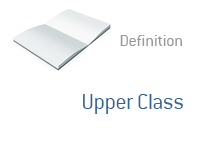Definition of Upper Class
What does the term "upper class" mean? What is the definition of the term "upper class"?
There is no widely accepted definition of the term "upper class". Some people believe that households enter "upper class" territory when they generate household income of more than $100,000 per year.
Some people, on the other hand, believe that the "middle class" income threshold extends all the way to the $250,000 level, and that in order to be considered part of the "upper class", your household needs to earn above that level.
 The "upper class", which includes the richest members of society, also yields the most power thanks to their large amount of wealth. The upper class includes people at the top of media companies and politicians - it's not hard to see why the upper class is so influential.
The "upper class", which includes the richest members of society, also yields the most power thanks to their large amount of wealth. The upper class includes people at the top of media companies and politicians - it's not hard to see why the upper class is so influential. The "upper class" is thought to include roughly 1-2% of the population.
Some of the professions that often find themselves in the "upper class" - business owners, CEOs, doctors, lawyers, professional athletes and politicians. In addition, some people will find themselves a part of the "upper class" thanks to a large inheritance.
Many people believe that the "upper class" do not pay their "fair share" of taxes. Many members of the "upper class", on the other hand, believe that they create many jobs and that higher taxes would negatively impact their businesses, resulting in less jobs being created.
--
Davemanuel.com Articles That Mention Upper Class:
None
